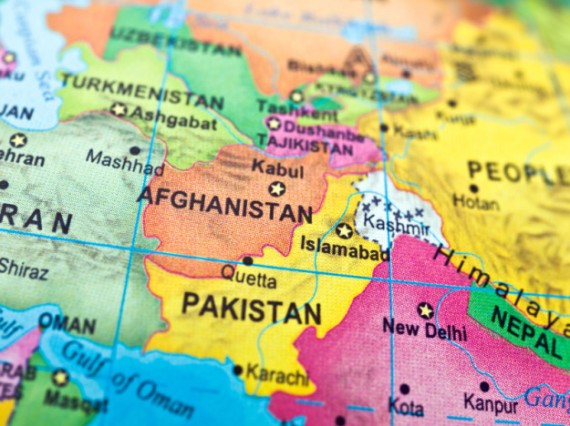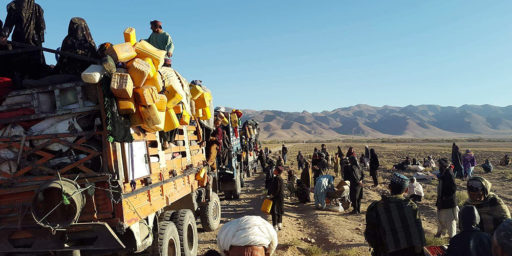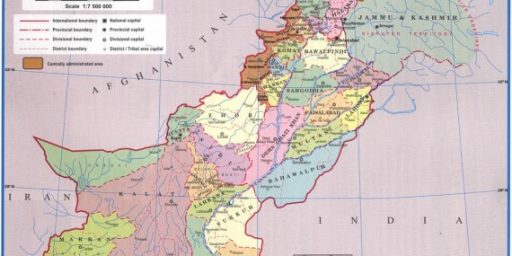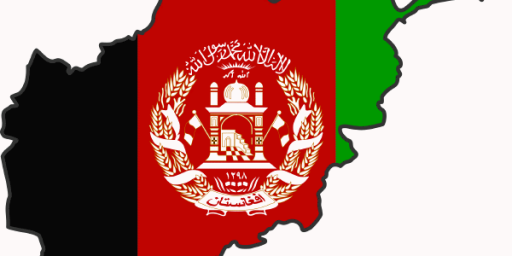Washington Fiddles While Pakistan Burns
While Americans concern themselves with domestic politics and mid-term elections, the situation in Pakistan seems to continue to get worse.
Insurgents are continuing to attack NATO supply convoys in Pakistan on their way to forces in Afghanistan:
A small bomb damaged an oil tanker carrying fuel for NATO troops in Afghanistan as it waited at Pakistan’s closed Torkham border crossing Tuesday. No casualties were reported.
The attack underscored the heightened threat posed to NATO supply lines amid Pakistan‘s closure of the border post six days ago to protest the death of three of its soldiers in a NATO helicopter strike. A backlog of NATO tankers and trucks cannot pass through Torkham.
Tuesday’s attack on a NATO convoy was the fifth such attack since the border closure began, reports the BBC. No one has claimed responsibility for the blast yet, although the Pakistani Taliban have admitted to previous convoy attacks, including one Monday that killed at least three people and destroyed nearly 30 vehicles.
With the border still closed thanks to a Pakistani protest over a friendly fire incident, these convoys are essentially sitting ducks. Which, of course, raises the question of whether or not the Pakistani Taliban are working in cooperation with certain elements of the Pakistani government, as many have long suspected.
Whatever the situation, though, it’s becoming eminently clear that Pakistan is, at best, a reluctant ally and, if that’s the case, then I think Bernard Finel hit the nail on the head on Thursday:
I think we need to be a little more clear-headed about the issue. If Pakistan chokes off supplied, or even if Pakistan fails to whole-heartedly support our efforts in Afghanistan it is game over. At that point, we need to think in terms of ending the mission and mitigating the consequences, not trying to cludge together some sort of minimal capacity to continue to pursue what, in the best of circumstances, are difficult goals.
As the great military strategist Kenny Rogers wrote, “you gotta know when to hold ’em, know when to fold ’em.” Well, if Pakistan is not going to be significantly on-board, it is time to fold ’em in Afghanistan. And remember, “fold ’em” does not mean losing. It does not mean handing over your stack of chips. It just means husbanding your chips to invest in a better hand in the future.
Unfortunately, with most of Washington distracted for the next four weeks by the mid-term elections, and then after that by the aftermath of said elections and what will undoubtedly by a contentious lame duck session, it’s unclear if or when anyone in Washington is going to pay attention to what’s going on in “Af/Pak” long enough to realize that we really have reached the end of the road as far as our current strategy goes.
As is usually the case in American politics, it’s unlikely change will come until the last possible moment, and then it may be too late.







I’m sure the random drone attacks and the targeted assassinations the U.S. military carry out in Pakistan have nothing to do with the the hatred Pakistanis feel towards America.
“Well, if Pakistan is not going to be significantly on-board, it is time to fold ‘em in Afghanistan. And remember, “fold ‘em” does not mean losing. ”
Oh really? I see – its just advancing in a different direction, eh?
What exactly do you see as the consequences if we just “fold ’em” in Afghanistan?
“Unfortunately, with most of Washington distracted for the next four weeks by the mid-term elections, ”
Actually, I don’t think the military, or even the President, is all that distracted by the mid-terms.
I suspect that they are fully engaged in the situation – I don’t know, just a guess….
” it’s unclear if or when anyone in Washington is going to pay attention to what’s going on in “Af/Pak” long enough to realize that we really have reached the end of the road as far as our current strategy goes.”
I see. People at all levels will inevitably agree with you if only they would pay as much attention to the situation as you do. Like…..read an article about it once in a while. Do you seriously think that you have a better handle on the situation than the people who live this every day?
Tano,
Based on the course of US policy in the region over the past 3-4 years, the only conclusion I can draw is that nobody in Washington has the slightest idea what they’re doing when it comes to this misguided war.
So it is not really some “distraction” because of the elections? Rather some deeper inability to formulate a winning strategy? Do you really think it is from lack of attention though (at least as far as this current administration is going?)
I’m willing to bet that getting the border crossing is a priority for a few people and negotiations are on-going. The problem is simply Pakistan wants us to stop bombing Pakistan vs the fact that all of the leaders of the Afghan inurgency are in Pakistan and we want to eliminate them. The immediate problem will be solved by bribing the right person, but that is a temporary solution. Long term Pakistan has to be sold on the whole mission, which they never have been (Maybe pre 2004?). Pakistan has zero interest in having a unified, stable Afghanistan on their border.
What it comes down to, and what it has come down to for the last several months/years, is we do not have popular support in the region and we are limited in what we can do. The military either hasn’t or is unwilling to realize this and the Administration is unwilling to push back because of pro-war opposition (which, in my opinion, is largely about the fact that the whole fiasco can be cast as an embarrasment to the president on television.)
I can’t imagine why Pakistan is a reluctant ally. I mean, it’s not like we’re routinely violating their sovereignty or bombing civilian targets within their borders or anything.
Oh wait….
Pakistan is upset because the people we are killing are the one they are counting on to take over in Kabul once we leave. Afghanistan is their ‘sphere of influance’ we should remember. They’re probably the same guys we allowed Pakistan to fly out just before kabul fell in ’01. Most of them were Pakistani soldiers and intell guys.
“Pakistan is upset because the people we are killing are the one they are counting on to take over in Kabul once we leave. ”
One day the ol’ “Bomb them ’til they love us” strategy will work.
Doug you’re mixing up the tactical and the strategic. The status of the trucks is tactical, they are stuck there as long as the Paks have the border closed. What are you going to do, turn them around and bring them home? I’m quite sure the Pentagon and State who are responsible for managing this situation are paying zero attention to the mid terms and straining every nerve to persuade the Paks to reopen the border. Or would you like the president to personally go and drive one of the trucks which seems to be how you think the govt works. I don’t disagree that Afghanistan is a shambles and that much of our strategy in Af/Pak is counter productive but that has been the case for considerably longer than 3-4 years. However, the Pentagon and the sainted Petraeus are still claiming it can be turned around.
c.red says:
Tuesday, October 5, 2010 at 12:47
“The military either hasn’t or is unwilling to realize this and the Administration is unwilling to push back because of pro-war opposition”
Basically I agree more or less entirely with your analysis and while domestic politics is undoubtedly a factor (it dictated much of US foreign policy 2001-2008) I believe the opposition issue now is more nuanced since a majority of the public would be comfortable with leaving. The problem is the professionals in the Pentagon and to a much lesser degree in the state department are for hanging in there. And make no mistake about it there are downsides to leaving. It’s the Pentagon that has to be over ruled basically and this has political and management overtones. For example, suppose the president summarily over ruled the Pentagon and Petraeus resigned. There would be a huge furore. Therefore, a process has to be gone through. I personally think we’re going through it as the military continues to flounder, and corruption and chaos grows, for all to see. At some point they are going to be told “it’s over.”
Joe,
The blockade and the attacks on the convoys — by the way there were two more attacks today in which at least a dozen fuel trucks, and their contents, were destroyed — are merely a symptom of a larger problem.
We are fighting a war in Afghanistan without any clear goal anymore, and we are doing so with the “help” of an “ally” who is clearly one in name only.
“We are fighting a war in Afghanistan without any clear goal anymore, and we are doing so with the “help” of an “ally” who is clearly one in name only.”
I don’t disagree with any of this and have said so numerous times. It’s just that sometimes for a lawyer you seem to have a singularly un-nuanced view of situations. I just don’t go for these one dimensional, over-simplifications. Af/Pak is Rubik’s cube, getting it out is going to take a lot of moves. Although I rib you occasionally, I expect you to understand this. Or don’t you want to be over estimated?
I hear what you’re saying, but if there’s an overly simplistic view of the AfPak situation, it’s the one that seems to currently prevail in Washington and among American political elites.
Many people, especially people on the right, seem to think that all we need to do is send more troops and the right General in there and everything will be fine. Not only does that assume that Petraeus’s plan has actually succeeded in Iraq (I think that’s still open for debate) but it ignores the fact that you’re talking about two very different parts of the world.
What I object to is the nation-building that our mission in Afghanistan seems to have morphed into sometime in the last 4-5 years. Thinking that we can bring functioning democracy to that country when their literacy rate is somewhere near 30% is absurd.
“I hear what you’re saying, but if there’s an overly simplistic view of the AfPak situation, it’s the one that seems to currently prevail in Washington and among American political elites.”
Well this is where I think you’re over simplifying Doug. It’s obvious there are divided counsels in Washington over Af/Pak as I think you or maybe Jim was saying when the Woodward book came out. My suspicion is that opinion looks something like this. Political staff 80% for leaving. State 50/50 for staying/leaving. Pentagon 80% for staying. Intelligence 65% for staying. And there are arguments on both sides. The problem is at bottom that to have remotest chance of achieving the goal of a stable and friendly AF is going to take hundreds of thousands of troops, literally trillions of dollars and years. And even then it’s a gamble. There’s no way the American people are going to underwrite this. The problem is the military won’t accept it and the military have a lot of power. So the only way you de-fang them is by demonstrating they are full of shit. And that’s what’s going on at the moment. It’s not pretty but in democracies sometimes the only way you demonstrate hot plates are hot is by letting some people get third degree burns. Personally I think Obama would be well advised to bite the bullet and tell the American people “were f******* in AF and were leaving” but this is not the way he operates which is with great caution. On the whole (given I’m rather impetuous) this isn’t a bad way of proceeding so I’m giving him the benefit of the doubt for the moment.